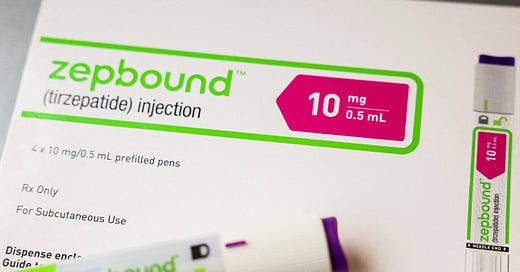CVS Dropped Zepbound. This Week, the Data Dropped Back.
Last week, CVS Caremark made the kind of move that shows you exactly how our healthcare system works. Or rather, how it doesn’t.
Starting July 1, CVS will drop Zepbound from its preferred coverage list and give that spot to Wegovy instead. That means millions of people across the country will be steered away from the stronger, more effective obesity medication—not because their doctor said so, not because of better results, not because of safety, but because of a contract. A deal. A discount.
And then, just a few days later, the data dropped.
SURMOUNT-5, the long-awaited head-to-head trial between Zepbound (tirzepatide) and Wegovy (semaglutide), was published in The New England Journal of Medicine and presented at ECO. The results weren’t even close.
After 72 weeks:
Zepbound delivered an average 20.2% weight loss
Wegovy delivered 13.7%
That’s a 47% greater relative reduction with Zepbound
Even when you zoom in on the goals that matter to real people trying to live in smaller bodies, Zepbound was the clear winner:
81.6% on Zepbound lost at least 10%
64.6% lost at least 15%
48.4% lost at least 20%
31.6% lost 25% or more
Wegovy’s numbers were solid, but not close:
60.5%, 40.1%, 27.3%, and 16.1% respectively
Even waist size favored Zepbound. People lost over 7 inches around the middle, compared to 5 on Wegovy.
Let’s say it plainly: this study should have sealed Zepbound’s place at the top of the obesity treatment ladder. But instead, CVS just pulled the ladder out from under millions of patients.
Why? Because Novo Nordisk offered them a better deal. According to reporting from Bloomberg and Fierce Pharma, the terms include a lower price point and potentially more favorable economics for PBMs.
It’s hard to overstate how backwards this is. We have a clear winner on outcomes, on patient success, on impact—and the system still picks the loser because it’s cheaper to them. Not to you. Not to your doctor. To the middlemen.
This is what we mean when we say patients are being treated like consumers instead of humans.
If you’re someone whose access to Zepbound is being ripped away by this decision, you’re not alone. And you’re not powerless.
You can:
Ask your doctor about a formulary exception or prior authorization
Point directly to the SURMOUNT-5 data to support your appeal
Explore the sleep apnea indication
Push back. Publicly. Loudly.
This moment is bigger than one drug or one formulary shift. It’s about whether clinical outcomes matter more than corporate contracts. It’s about who gets to decide what kind of care people living with obesity deserve. And it’s about reminding every PBM, every payer, and every policymaker that we’re not going to sit quietly while they play games with our lives.
We’ll be publishing a follow-up with practical steps you can take to fight for access, and I’ll be discussing it on the podcast this week.
Until then, here’s your takeaway:
Zepbound just proved it’s the best. CVS just proved that’s not what matters to them.
Let’s make it matter.
If this resonates with you, share it. Forward it to someone who needs to know. Subscribe to On The Pen for the full breakdowns, the real talk, and the resources to fight back.






If (when?) Most Favored Nation pricing takes effect on GLP-1 medications, people will be better off private paying for Zepbound than using insurance and being forced to a less effective drug their doctor hasn’t prescribed. Things are upside down when doctors can’t make decisions that are in the interest of their patients. Big pharma and the insurance industry need to be reigned in.
Not even the same medication…and they don’t care!